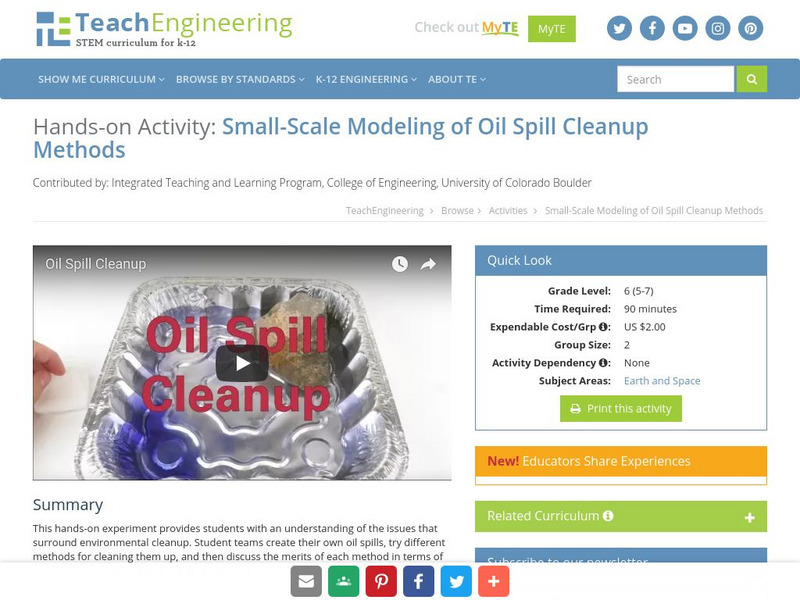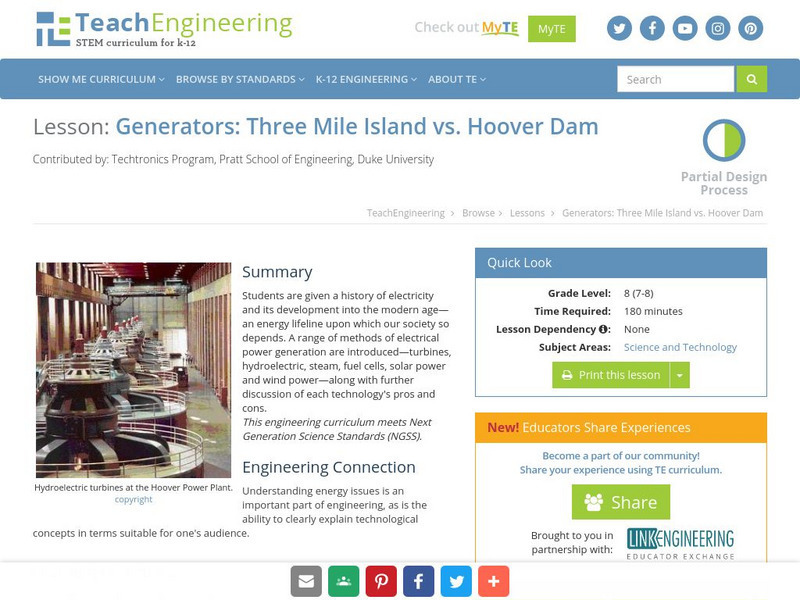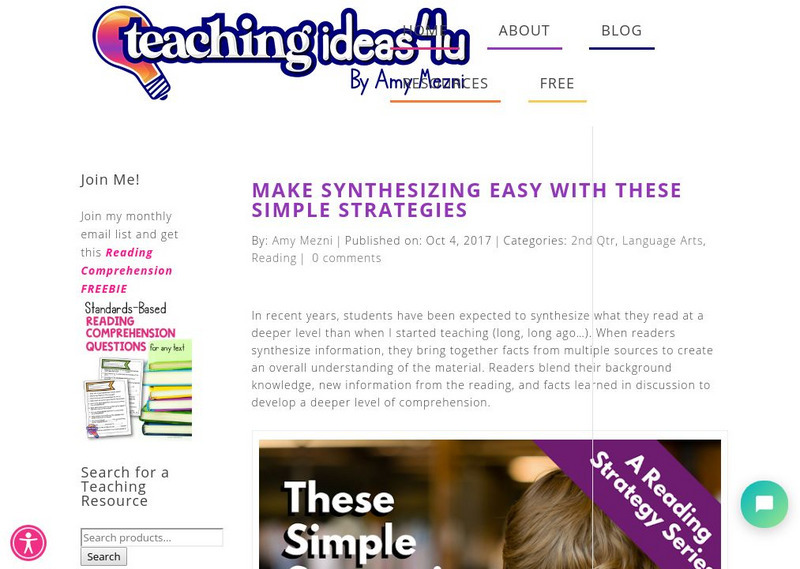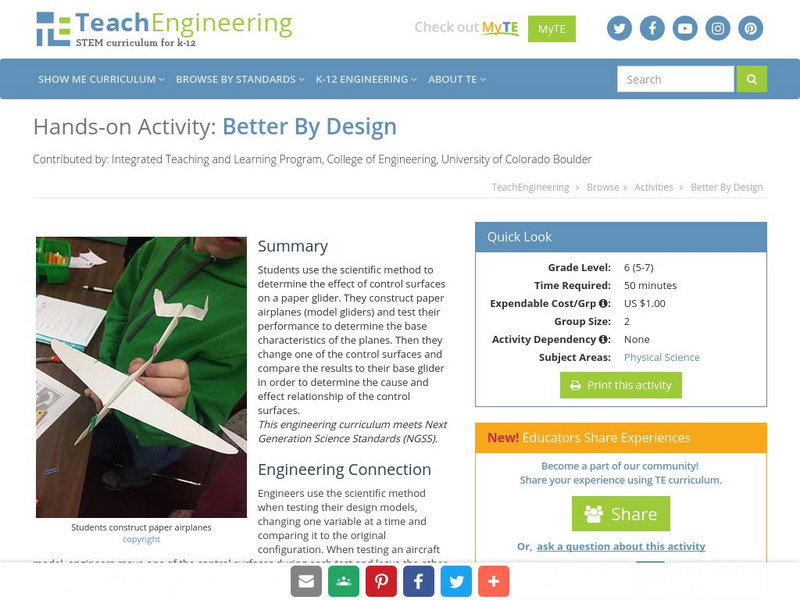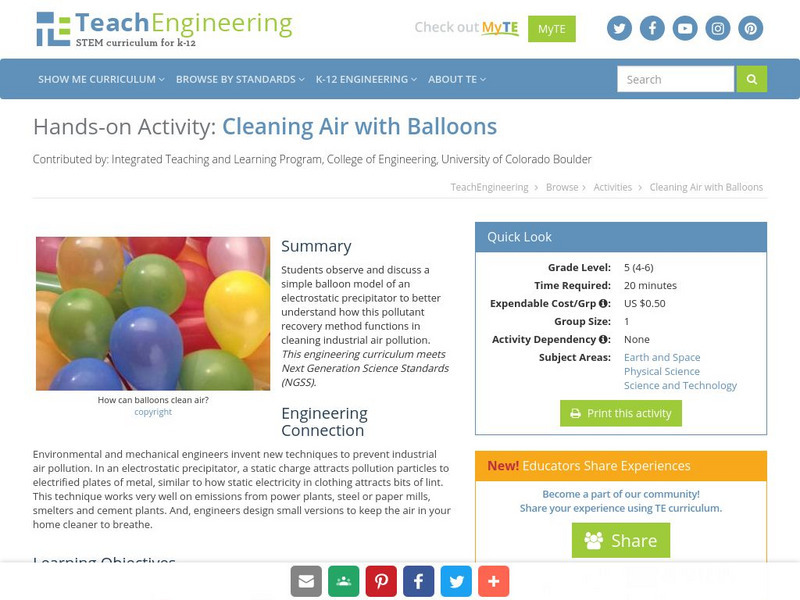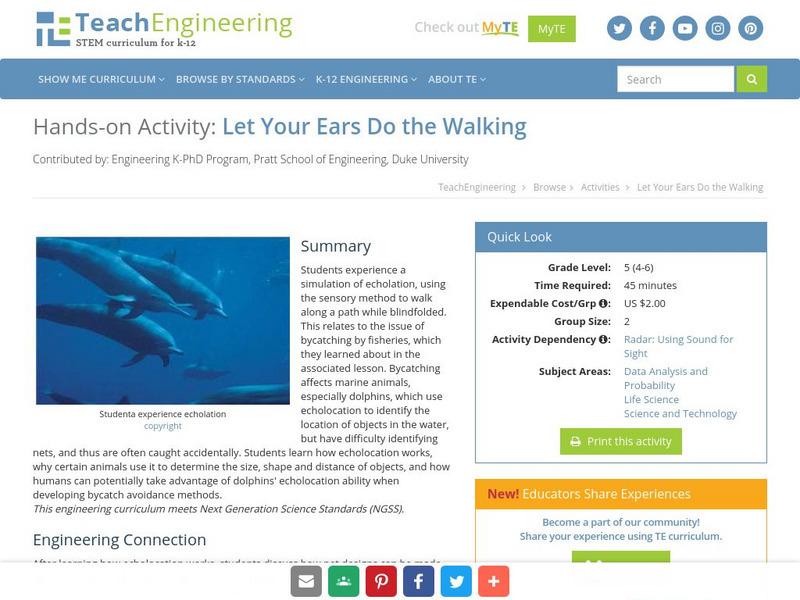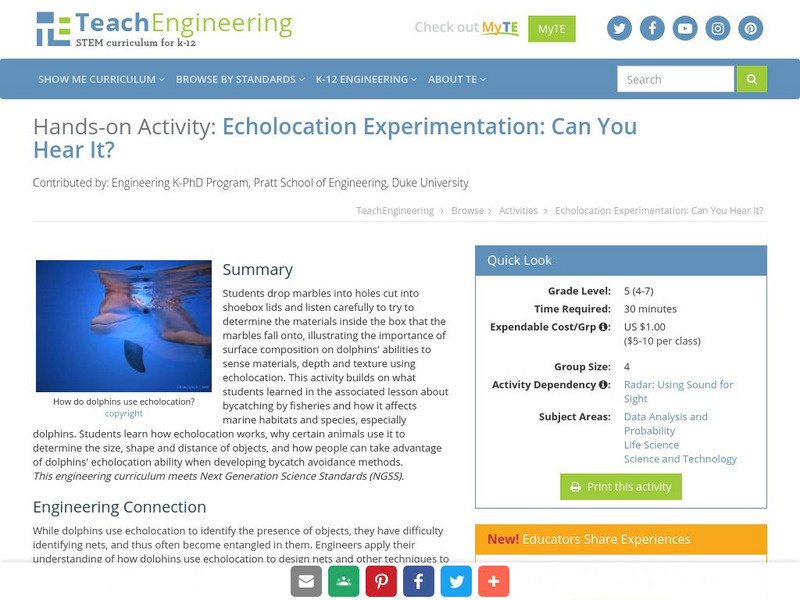Science Buddies
Science Buddies: Teaching the Scientific Method With Paper Rockets
This lesson will introduce your students to the scientific method using a fun, hands-on activity.
TeachEngineering
Teach Engineering: Oil Spill Cleanup
This hands-on experiment will provide students with an understanding of the issues that surround environmental cleanup. Students will create their own oil spill, try different methods for cleaning it up, and then discuss the merits of...
TeachEngineering
Teach Engineering: Heave Ho!
Students will discover the scientific basis for the use of inclined planes. They will explore, using a spring scale, a bag of rocks and an inclined plane, how dragging objects up a slope is easier than lifting them straight up into the...
TeachEngineering
Teach Engineering: What's Hiding in the Air?
Students develop an understanding of the effects of invisible air pollutants with a rubber band and hanger air test and a bean plant experiment. They also learn about methods of reducing invisible air pollutants.
TeachEngineering
Teach Engineering: Washing Air
Students observe and discuss a simple model of a wet scrubber to understand how this pollutant recovery method functions in cleaning industrial air pollution.
TeachEngineering
Teach Engineering: This Landfill Is a Gas!
In this activity, students work as engineers to build and observe a model landfill. They will understand the process and pitfalls of the use of landfills as a method for the waste disposal.
TeachEngineering
Teach Engineering: The Dirty Water Project
In this activity, students investigate different methods (aeration and filtering) for removing pollutants from water. They will design and build their own water filters.
TeachEngineering
Teach Engineering: It Takes Two to Tangle
Students explore the theme of conflict in literature. They learn the difference between internal and external conflict and various types of conflicts, including self against self, self against other, and self against nature or machine....
TeachEngineering
Teach Engineering: Rolling Blackouts & Environmental Impact
The goal is for the students to understand the environmental design considerations required when generating electricity. The electric power that we use every day at home and work is generated by a variety of power plants. Power plants...
TeachEngineering
Teach Engineering: Generators: Three Mile Island vs. Hoover Dam
Students are given a history of electricity and its development into the modern age lifeline upon which we so depend. The methods of power generation are introduced, and further discussion of each technology's pros and cons follows.
Daily Teaching Tools
Daily Teaching Tools: Concept Attainment: The Most Compelling Inductive Teaching
A step by step explanation of how to structure and use inductive teaching methods in a lesson. Examples are provided.
Goshen College
Planning Art Lessons
For the new art teacher or the veteran. This is a helpful reminder of ways to organize your teaching methods. It could spark some life (back) into your classrooms.
Other
Teaching Ideas 4u: Make Synthesizing Easy With These Simple Strategies
Learning to synthesize can be challenging for some students, but there are a few different support strategies that teachers can use in their lessons: REST method, ADD method, and Venn Diagram to teach synthesizing.
TeachEngineering
Teach Engineering: Better by Design
The purpose of this activity is to use a scientific method to determine the effect of control surfaces on a paper glider. The students will construct a paper airplane/glider and test its performance to determine the base characteristics...
TeachEngineering
Teach Engineering: Are You in Control?
This lesson teaches the engineering method for testing wherein one variable is changed while the others are held constant. Students compare the performance of a single paper airplane design while changing the shape, size and position of...
TeachEngineering
Teach Engineering: Cleaning Air With Balloons
Students observe and discuss a simple balloon model of an electrostatic precipitator to better understand how this pollutant recovery method functions in cleaning industrial air pollution.
TeachEngineering
Teach Engineering: A Merry Go Round for Dirty Air
Students observe and discuss a cup and pencil model of a cyclone to better understand how this pollutant recovery method functions in cleaning industrial air pollution.
TeachEngineering
Teach Engineering: Spin Me a Story
In a spin-off to studying about angular momentum, students use basic methods of comparative mythology to consider why spinning and weaving are common motifs in creation myths and folktales. Note: The literacy activities for the Mechanics...
TeachEngineering
Teach Engineering: Find It!
In this activity students will learn the basic concept of Global Positioning Systems (GPS) using triangulation and measurement on a small scale in the classroom. Students discover how GPS and navigation integrate mathematic and...
TeachEngineering
Teach Engineering: Patterns and Fingerprints
Students apply several methods developed to identify and interpret patterns to the identification of fingerprints. They look at their classmates' fingerprints, snowflakes, and "spectral fingerprints" of elements. They learn to identify...
TeachEngineering
Teach Engineering: All Caught Up
Commercial fishing nets often trap unprofitable animals in the process of catching their target species. In the following activity, students will experience the difficulty that fishermen experience while trying to isolate a target...
TeachEngineering
Teach Engineering: Let Your Ears Do the Walking
In the previous lesson, students learned about the issue of bycatching by fisheries and how it affects marine habitats. Dolphins are one of the main species affected by bycatching. Dolphins use echolocation to identify the location of...
TeachEngineering
Teach Engineering: Can You Hear It?
In the previous lesson, students learned about the issue of bycatching by fisheries and how it affects marine habitats. Dolphins are one of the main species affected by bycatching. While dolphins can use echolocation to identify the...
TeachEngineering
Teach Engineering: Map That Habitat
Historically, sea floor mapping occurred with a more simple data collection method: soundings. Soundings are taken by dropping a weight with a pre-measured rope off the side of the boat and noting the measurement on the rope when the...

